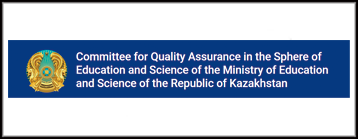Enlarged laboratory experiments of ferrous metallurgy dust sintering with calcium chloride
DOI:
https://doi.org/10.31643/2025/6445.40Keywords:
dust, lead, zinc, extraction, chlorinating sintering.Abstract
In this work, large-scale laboratory experiments were carried out on high-temperature sintering of clinker with CaCl2. New data were obtained on the extraction of zinc, lead and related impurities into the targeted products of high-temperature sintering under process scaling conditions. The optimal parameters for high-temperature sintering have been established: t =900 °C, τ = 60 minutes, CaCl2 consumption is 1.3 times higher than its consumption from the stoichiometric required amount (SRA). High quality zinc sublimates were obtained. The maximum extraction of zinc into sublimates was achieved - 98.2%. New data have been obtained on changes in the quantitative ratios of clinker ingredients under sintering conditions. It has been established that zinc in the form of chloride is concentrated in sublimations. The obtained results form the basis of the final stage of the chlorination technology for processing lead-containing zinc dust from ferrous metallurgy and were used in the developing of a general technology for the selective extraction of zinc and lead into marketable products.
Downloads
References
Ashrit SS, Sarkar S, Singh R, Yadav S Z, Chatti RV. Characterization of blast furnace flue dust – A multi analytical techniques approach. Metall. Res. Technol. 2020; 117:606-613.
Zhang J, Zhang Y, Long Y, Du P, Tian T, Ren Q. Multi-source ferrous metallurgical dust and sludge recycling: present and future prospects. Crystals. 2024; 14(3):273. https://doi.org/10.3390/cryst14030273
Li Y, Feng H, Wang J, She X, Wang G, Zuo H, Xue Q. Current status of the technology for utilizing difficult-to-treat dust and sludge produced from the steel industry. J. Clean. Prod. 2022; 367:132909.
Kadyrov AS, Kunaev VA, Georgiadi IV. Prospects for Processing of Ferrous Metallurgical Waste Based on Arcelormittal Temirtau Experience. Metallurgist. 2018; 62:22-28. https://doi.org/10.1007/s11015-018-0620-3
Berdiyarov BT, Khojiev ShT, Rakhmataliev Sh, Karimov OM. Processing of secondary ferrous waste is a technology for processing dust generated in furnaces. Education And Science In The Xxi Century. 2023; 38(2):21.
Yakornov SA, Panshin AM, Kozlov PA, Ivakin DA. Development of technology and instrumental scheme of pyrometallurgical processing of ferrous metallurgy dusts. Tsvetnye Metally. 2017; 9:56-66. https://doi.org/10.17580/tsm.2017.09.06
de Araújo JA, Schalch V. Recycling of electric arc furnace (EAF) dust for use in steel making process. J. Mater. Res. Technol. 2014; 3:274-279. https://doi.org/10.1016/j.jmrt.2014.06.003
Brandner U, Antrekowitsch J, Leuchtenmueller M. A review on the fundamentals of hydrogen-based reduction and recycling concepts for electric arc furnace dust extended by a novel conceptualization. International Journal of Hydrogen Energy. 2021; 46(62):31894-31902. https://doi.org/10.1016/j.ijhydene.2021.07.062
Kovtun O, Levchenko M, Höntsch S, Lohmeier L, Schreiner M, Gräbner M, Volkova O. Recycling of Iron-Rich Basic Oxygen Furnace Dust using Hydrogen-based Direct Reduction. Resources, Conservation & Recycling Advances. 2024, 200225. https://doi.org/10.1016/j.rcradv.2024.200225
Pei P, Wang J, Wang Y, Hu W, Wang B, Zhou J. Waste control by waste: Extraction of valuable metals from mixed metallurgical dust by boiling furnace roasting. Separation and Purification Technology. 2024; 346:127452. https://doi.org/10.1016/j.seppur.2024.127452
Halli P, Agarwal V, Partinen J, Lundström M. Recovery of Pb and Zn from a citrate leach liquor of a roasted EAF dust using precipitation and solvent extraction. Separation and Purification Technology. 2020; 236:116264. https://doi.org/10.1016/j.seppur.2019.116264
Frueholz R, Conde AS, Habermaier C, Spiess S, Birklbauer L, Wallner M, Haberbauer M. Zinc removal from metallurgical dusts with iron-and sulfur-oxidizing bacteria. Minerals Engineering. 2024; 206:108535. https://doi.org/10.1016/j.mineng.2023.108535
Binnemans K, Jones PT, Manjón Fernández Á, Masaguer Torres V. Hydrometallurgical processes for the recovery of metals from steel industry by-products: A critical review. J. Sustain. Metal. 2020; 6(4):505-540. https://doi.org/10.1007/s40831-020-00306-2
Kang MJ, Kwon YK, Yu S, Lee PK, Park HS, Song N. Assessment of Zn pollution sources and apportionment in agricultural soils impacted by a Zn smelter in South Korea. J. Hazard. Mater. 2019; 364:475-487.
Dong W, Wang Y, Peng J, Li Y, Cao X, Di Y, Huang Y, Li R. Extracting zinc from ironworking dust having a high zinc content by vacuum silicothermic reduction. Process Safety and Environmental Protection. 2024; 182:1237-1249. https://doi.org/10.1016/j.psep.2023.12.036
Deng X, Huang R, Lv X, Yang J, Yang J. Separation and recovery of metallic zinc and iron concentrate from blast furnace dust by vacuum carbothermal reduction. Process Safety and Environmental Protection. 2022; 162:746-751. https://doi.org/10.1016/j.psep.2022.04.050
Zhu D, Wang D, Pan J, Tian H, Xue Y. A study on the zinc removal kinetics and mechanism of zinc-bearing dust pellets in direct reduction. Powder Technology. 2021; 380:273-281. https://doi.org/10.1016/j.powtec.2020.11.077
She X, Wang J, Wang G, Xue Q, Zhang X. Removal Mechanism of Zn, Pb and Alkalis from Metallurgical Dusts in Direct Reduction Process. J. Iron Steel Res. Int. 2014; 21:488-495. https://doi.org/10.1016/S1006-706X(14)60076-5
Nayak N. Characterization of blast furnace flue dust-an assessment for its utilization. Mater. Today Proc. 2022; 50(5):2078-2083. https://doi.org/10.1016/j.matpr.2021.09.417
Dosmukhamedov NK, Koishina GM, Zholdasbay EE, Argyn AA. Extraction of lead during low-temperature sintering of dust from melting scrap metal in an electric arc furnace with ammonium chloride. CIS Iron and Steel Review. 2024; 2.
Koishina GM, Dosmukhamedov N K, Kaplan VA, Zholdasbay EE, Argyn AA. Extraction of zinc from dust of electric arc furnace by high temperature chlorinating sintering. Engineering Journal of Satbayev University. 2024.
Xing Z, Cheng G, Yang H, Xue X, Jiang P. Mechanism and application of the ore with chlorination treatment: A review. Minerals Engineering. 2020; 154:106404. https://doi.org/10.1016/j.mineng.2020.106404
Downloads
Published
How to Cite
Issue
Section
License
Copyright (c) 2024 Dosmukhamedov, N., Koishina, G., Zholdasbay, E., Argyn, A., & Icheva, Y.

This work is licensed under a Creative Commons Attribution-NonCommercial-NoDerivatives 3.0 Unported License.


























